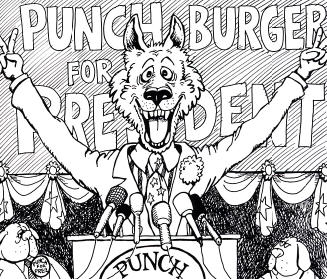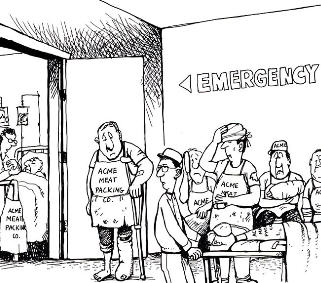Transcendental Commentary on the Issues of the Day
Ask Punch Burger to assess his chances of winning the 1988 U.S. presidential election, and he's likely to honestly reply, "Ruff!"
Punch is a real dog of German shepherd and keeshound parentage, in fact and he's lined up beside some one hundred forty other candidates registered with the U.S. Federal Election Commission to run in the upcoming presidential race. His campaign manager (and owner) Laura Van Sant thinks he measures up pretty well. She explains, "He's no Gary Hart: he was neutered at six months."

Van Sant registered Punch as a commentary on the quality of this year's U.S. presidential candidates. Americans love to criticize their leaders and potential leaders, and during election year parodies and satires proliferate. Yet an underlying frustration inspires the jokesters: Why can't the people of a great nation like the United States elect a great person to lead the country? Why so many mediocre candidates?
One answer, which lies in the very essence of the American political system, is that the power is in the hands of the citizens, who are for the most part blinded by selfish interests for immediate gratification and have no understanding of the actual consequences of their political demands.
This is a grave flaw of democracy, which Srila Prabhupada sometimes called "demon-crazy." People are mainly concerned with expanding their economic prowess, or in some other way adding to the comforts of life, and their attention is distracted from the loftier goal of spiritual progress, which currently has no place in politics or government leadership.
The Vedic literatures, however, while stressing that leaders must provide peace and prosperity for the citizens, also demand that leaders establish an environment for the spiritual advancement of the citizens. Leaders must convince the citizens that moral values such as nonviolence, chastity, sobriety, sensual restraint, honesty, and so on are not tenets of some particular religion, but are important qualities to be developed by anyone who understands that human life is meant for elevation in the next life.
A society of such thoughtful persons, directed by God conscious leaders, is a real human society. Human beings have no business spending all their days and nights preoccupied with the things that so absorb the animals, such as eating, mating, sleeping, and defending. Seeing human beings so bewildered, Srila Prabhupada would point out that they are indeed no better than animals. He writes:
So Srimad-Bhagavatam's categorization of the common man without any spiritual enlightenment into the society of dogs, hogs, camels and asses is not at all an exaggeration. The leaders of such ignorant masses of people may feel very proud of being adored by sue ha number of dogs and hogs, but that is not very flattering. The Bhagavatam openly declares that although a person may be a great leader of such (Jogs and hogs disguised as men, if he has no taste for being enlightened in the science of Krsna, such a leader is an animal and nothing more. He may be designated as a powerful, strong animal, or a big animal, but in the estimation of Srimad-Bhagavatam, he is never given a place in the category of men, on account of his atheistic temperament. Or, in other words, such godless leaders of dogs and hoglike men are bigger animals with qualities of animals in greater proportion." (Bhag. 2.3.19, purport)
Srila Prabhupada is not simply name-calling. He is attempting to awaken us to the reality of our present society.
In America, as in democracies all over the world, the ability to affect change lies in the hands of the people. For people to make intelligent political choices they must be able to distinguish men from dogs. If someone is promising essentially nothing more than bigger food rations, bigger fangs to show the enemies, and more opportunities for unrestricted sex (things that Punch might readily advocate), then the perceptive voter must demand something nobler. A public interested in spiritual rather than material benefits from presidential candidates can certainly help to improve the quality of our choices.
The citizens must therefore make spirituality the priority in life and in their relations with their leaders. Otherwise they will only continue to bemoan the caliber of their presidential choices.
One politician observed, "The American people have the constitutional right to be wrong" and at this stage they are taking full advantage of this right. But, on the other hand, they also have the constitutional right to be right, if they so desire.
You Can't Beef About Karma
by Satyaraja dasa
The Occupational Safety and Health Administration last week proposed a record $2.59 million fine against IBP, alleging that in 1985 and 1986 the largest U.S. meat-packer knowingly failed to record 1,038 job-related injuries at its Dakota City, Neb., plant. The unreported cases included knife wounds, concussions, burns, hernias, fractures and carpal tunnel syndrome, a painful condition of the wrist and hand often caused by repetitive motion.
The plant is not unique. Between 1981 and 1985 meatpacking had the highest rate of job-related injuries and illnesses of any industry. Time, August 3, 1987
Is it mere coincidence that injuries and illnesses to this degree should befall those who slaughter animals for a living? Or is there perhaps a connection?
According to the Vedic literatures, there is indeed a connection. It is called karma, a subtle law of nature that prescribes a reaction for every action.
We can perform three types of activity: (1) pious activity, or that prescribed by the scriptures, (2) activity motivated by our selfish desires and without reference to the scriptures, and (3) activity meant for the satisfaction of God.
Meat-eating and everything related to it such as meat-packing would definitely fall into the second category, called vikarma. Vikarmic activities always result in suffering. Persons involved with the meat industry are implicated in the suffering of countless animals and must therefore suffer horrible reactions under the law of karma. From the Vedic scriptures we can understand that such things as the hernias, fractures, and carpal tunnel syndromes of meat-packers are only a glimpse of what lies ahead in their karmic destiny.

The Vedic scriptures clearly condemn all the activities connected with the meat industry as among the most sinful, and the Bible, with its command "Thou shall not kill," also warns of the injustice of taking another creature's life.
Fortunately, though we may be entangled in our karma now, we can change our destiny if we are willing to change our activities. The third kind of activity mentioned above is called akarma, meaning, literally, "without action," because this particular kind of activity service to God is beyond the ordinary action and reaction of this world; it is transcendental. Devotional service to God not only incurs no karmic reaction, it frees us from the reactions to our previous activities.
If one works for his own selfish ends in this world, he must naturally absorb the full reaction to his work. But if one surrenders to God, God accepts all the reactions for one's work, and one becomes free from karma.
Because the karmic penalties for working in relation to the slaughter of animals are severe, people should be discouraged from working in this way. Meat-eaters may not immediately experience the injuries and illnesses of the meat-packers, but karmic reaction will be there nonetheless. No good reaction can result from supporting the slaughter of animals.
